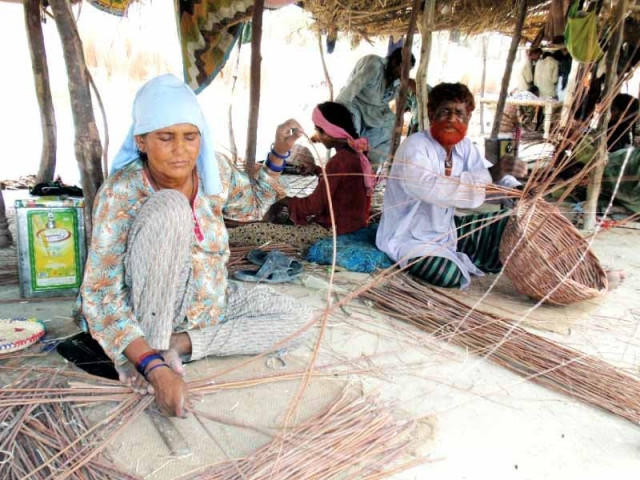Weaving dreams: Another season, another basket
Basket weaving families lead nomadic lives to make ends meet.

Nomadic families make around 35 baskets every day, which sells from Rs50 to Rs90 depending on size and quality; around 40 kg of straws make 25 baskets and cost Rs1,000. PHOTO: SARFARAZ MEMON/EXPRESS
Thirty years ago, blanketed by hope and youthful excitement, Mai Haleema married Nazar Mohammad and moved to Dadu. At that time, there was no way she could have known that all her dreams would come crushing down upon her in the form of a basket. No way she could have known one simple basket that her mother-in-law ordered her to make as a new bride would become never-ending labour.
“My hands were very soft, very smooth at the time of my marriage,” says Haleema quietly.
“They are so rough now. The long years of hard work show all too well.”
The livelihood of Nazar’s family, like that of countless others, is dependent primarily on basket weaving. Thus, Haleema, too, became an earning tool one week after her marriage.
An annual occurrence
Haleema’s family is not unique. Every year, like clockwork, thousands of nomadic families throng to Khairpur district in the month of June, which coincides with the start of the date season.

In search of livelihood, these families assemble in the district from all over. Most hail from Dadu, Naushehro Feroze, Jacobabad, Kashmore and some parts of southern Punjab. From the last week of June to the end of the first week of August, they toil incessantly. Some weave baskets, some make mats, some work in the date orchards, while others climb date trees. When the season ends, they often pack up and move to other areas of the country, where more baskets – albeit those of a different kind – are needed.
Nothing’s easy
“I was the youngest of eight siblings and treated like a princess, a shahzadi. Look at this shahzadi now, weaving baskets just to survive,” remarks Haleema.
Three of Haleema’s daughters have been married to their cousins who, too, are in the same business. “I don’t want the remaining two to marry into such families,” she states assertively.
Haleema’s husband, Nazar, looks much older than her. He has been weaving since he was merely eight years old.
“It’s the only thing I am an expert at,” he says.
According to Nazar, he, his wife, their two sons and their wives, make around 35 baskets each day. The selling price of each basket ranges from Rs50 to Rs90, depending on size and quality.
“We bring straws used for weaving from the kacha areas,” Nazar explains. “40 kg of straws, which amounts to 25 baskets, costs us around Rs1,000.”
Nomadic survival
Ghulam Qadir and his family have come all the way from Moro to earn some money.
“With eight children, it’s extremely difficult to make ends meet, especially when you consider the rising inflation,” says Qadir.
Once the work ends here, Qadir says he and his family will move to Larkana, where they will make baskets for guavas.
Rasool Bux, 55, has also settled into a similar nomadic lifestyle. Hailing from Daulatpur, he has been making baskets since he was ten years old.
“Even our forefathers were in this business,” he states. According to Rasool, a bigger basket for an animal can sell for up to Rs1,500. He is helped by his wife Sharma with all the work.
“Our day starts at dawn and continues until sunset,” she says with a tired smile.
Published in The Express Tribune, July 18th, 2013.



















COMMENTS
Comments are moderated and generally will be posted if they are on-topic and not abusive.
For more information, please see our Comments FAQ